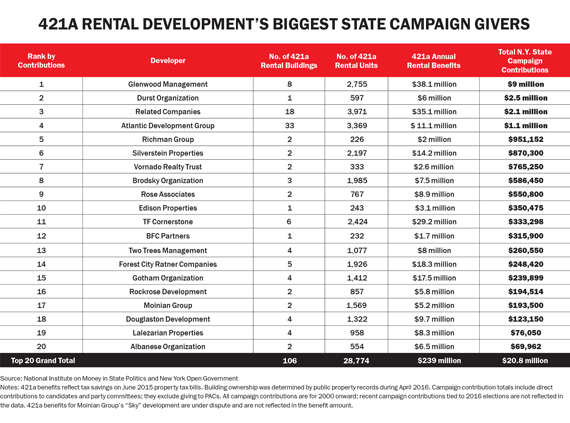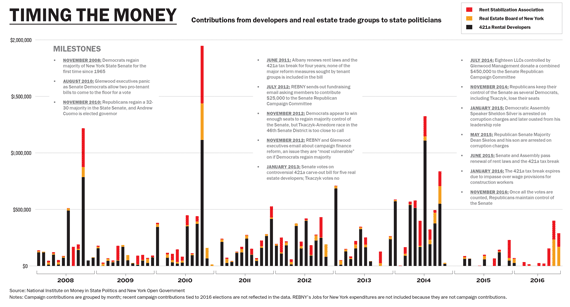This story was co-published with ProPublica.
In 2014, an obscure campaign in the foothills west of Albany between a sheep farmer and a home builder mushroomed into one of the most expensive State Senate elections in New York history. Each side’s supporters spent at least $3.5 million, or more than four times the cost of the average U.S. House of Representatives contest that year.
The bulk of the money poured in from outside the district. Labor unions and national committees for campaign finance reform backed incumbent Democrat Cecilia Tkaczyk, the farmer. Some contributions to her opponent, Republican George Amedore Jr., which helped fund his television attack ads, were harder to trace. The money came from the Senate Republican Campaign Committee, which collected it from limited liability companies at glamorous Manhattan addresses, including Hawthorn Park, a 339-unit luxury tower with sweeping views of the Hudson River, as well as The Fairmont, The Encore and The Pavilion — all high-end rental towers.
The LLCs, in turn, were arms of Glenwood Management, a developer of upscale Manhattan residential properties — and the New York real estate industry’s largest contributor to political campaigns. Each election cycle, millions of dollars flow to Albany from luxury residential buildings, office towers and parking garages controlled by some of New York City’s biggest tycoons. What the buildings have in common is that they’re owned by LLCs, a structure shielded from New York’s tight restrictions on corporate campaign donations. Thanks to their vast networks of such entities, developers can give virtually unlimited sums each campaign season. In one day in 2014, Glenwood funneled $450,000 in contributions to two accounts for the Senate Republican Campaign Committee through 18 separate LLCs.
Exploiting the LLC loophole has been a shrewd investment for the real estate industry. The state oversees New York City’s system of capping rent increases, known as rent stabilization. By influencing state elections, developers have undermined rent stabilization and preserved a key tax break that saves them far more money than they spend on political campaigns. The value of that subsidy, which is known as 421a, has soared from $73 million in 1986 to an estimated $1.4 billion this year. In return for the tax benefit, owners are supposed to limit rent increases and set aside a portion of units in high-demand neighborhoods for below-market rents — though they often don’t fulfill their commitments.
For developers, “it’s critically important to beat candidates like CeCe Tkaczyk if they want to maintain their hold on rental laws,” said David Donnelly, director of Friends of Democracy, a Super PAC that spent on Tkaczyk’s behalf. “It is one of the costs of doing business.”
To gauge the scope of 421a-related giving, The Real Deal and ProPublica worked with the National Institute on Money in State Politics, a nonprofit that tracks political spending, to map contributions from LLCs and individuals tied to the 60 biggest developers of New York rental properties receiving the subsidy. While it’s long been known that developers donate a lot of money to state elections, the analysis shows for the first time just how tactical the industry is about bankrolling candidates across the state that are friendly to its cause.
The first-of-its kind analysis identified $21 million in donations to state candidates and party committees since 2000. That represents one-fourth of the real estate industry’s total $83 million in contributions over that time, the most of any industry tracked by the institute. Most of the contributions were made through LLCs. Glenwood Management was the biggest donor, at $9 million, followed by the Durst Organization at $2.5 million and Related Companies at $2.1 million.
 Gov. Andrew Cuomo was by far the largest recipient of donations from the taxpayer-subsidized developers. He collected $4.2 million across his runs for governor and attorney general — of which about one-third came from Glenwood. Tenant advocates derided him as “Governor Glenwood” in 2015 when he stayed on the sidelines during a legislative tussle over rent laws.
Gov. Andrew Cuomo was by far the largest recipient of donations from the taxpayer-subsidized developers. He collected $4.2 million across his runs for governor and attorney general — of which about one-third came from Glenwood. Tenant advocates derided him as “Governor Glenwood” in 2015 when he stayed on the sidelines during a legislative tussle over rent laws.
Cuomo spokeswoman Dani Lever said in a statement that the governor “refused to sign off on a plan that didn’t provide enough affordability for tenants…No contribution of any size will influence a government action, period.”
Another $8.9 million in contributions from developers went to New York State Senate candidates and party committees, with two-thirds flowing to Republicans. While the Democrat-dominated Assembly has long been receptive to tenants, the Republican-led Senate has generally sided with landlords. That dynamic has turned races like Tkaczyk-Amedore into high-stakes battlegrounds for an industry determined to protect its tax break and its diluting of rent stabilization.
Setting agendas
Money “drives the whole process,” said Kenny Schaeffer, co-chairman of the Metropolitan Council on Housing, a New York City tenants’ rights group. “There’s no policy reason for state senators from around the state to be passing bad housing laws for New York…It just explains why we’re in the situation that we’re in with rent law and why they open up their piggy bank to hold on to that majority.”
The president of the Real Estate Board of New York (REBNY), the industry’s trade association, defended the giving. “New York’s success and that of its real estate industry are inextricably intertwined,” John Banks said in a statement. “So it is no surprise that our members are among the most civically, philanthropically and politically active. We support candidates — Democrat or Republican — who we believe support that vision.”
While most of their valuable properties are in New York City, developers directed almost two-thirds of their Senate donations to candidates in upstate and Long Island races. The biggest beneficiary, though, was a Bronx Democrat: Jeff Klein. The former deputy majority leader, who now heads an independent caucus of Democrats, has received almost $320,000 since his election to the Senate in 2004 from big developers with 421a subsidies. Glenwood contributed almost half of the total. Timothy Kennedy, a conservative upstate Democrat, ranked second at $208,550, followed by Bob Cohen, an unsuccessful 2012 Republican candidate for a Senate seat in Westchester County, at almost $200,000. Amedore, Tkaczyk’s opponent in 2012 and 2014, ranked fourth, with $140,700.
The industry’s Senate allies not only promote legislation in its interests, but also stymie opposing bills from reaching a floor vote. Bills to regulate rents, usually sponsored by senators from New York City, languish in committee. “I never get a chance to vote for them,” said Liz Krueger, a Democrat from Manhattan’s Upper East Side. (Krueger has personally donated to ProPublica in 2015 and 2016, giving less than $500 each year.)
Glenwood’s headquarters is a nondescript two-story office building off a four-lane road in New Hyde Park, Long Island. Its parking lot is filled with economy-line sedans, and its closest neighbor is a Mexican restaurant known for its cotton candy. The headquarters’ dimly lit lobby features black-and-white pictures of five Glenwood-owned residential buildings — The Barclay, The Stratford, The Lucerne, The Pavilion and The Fairmont — that have collectively given at least $2.2 million to state politicians. No one was available to discuss the firm’s donations, and subsequent calls and emails were not returned.
More than 20 other real estate developers, including substantial donors to New York state politicians, declined to comment or ignored requests for comment for this story. Jordan Barowitz, a spokesman for the Durst Organization, a residential developer that also owns more than 13 million square feet of commercial space in the city, implied that persuading developers to discuss their campaign contributions publicly was no easy task. An email response from him read in its entirety, “Best of luck to you.”
Some developers take their cues from REBNY without following the intricacies of state government races. “I try to stay out of politics,” said David Picket of the Gotham Organization, the developer of the 698-apartment Gotham West in Manhattan. “We donate to whomever the Real Estate Board deems worthy of interest.”
New crop
Tkaczyk wasn’t expecting a political career. A third-generation farmer from rural New Jersey, she was planning to go into the family occupation when her life took an urban twist. In 1985, she and her husband moved to a Boston suburb so he could pursue a physics doctorate at the Massachusetts Institute of Technology.
Tkaczyk took a $16,000-a-year job as a secretary at Harvard Law School. Harvard’s clerical workers were trying to start a union, and she signed up as a part-time organizer. Employees narrowly voted to approve the union in 1988, and Tkaczyk found her calling. “At my heart, I’m an organizer,” she said.
A few months later, she and her husband bought an 1830s farmhouse west of Albany. Tkaczyk worked for nonprofit groups, lobbying legislators for affordable housing and supporting tenants’ rights. She impressed Krueger, the Upper East Side senator, who helped her land a job in 2009 as a housing policy analyst for Senate Democrats.
For once, the party held a slim majority, giving pro-tenant bills a chance. So Krueger and other senators pushed for repeal of a law, known as vacancy decontrol, that removed limits on rent hikes for apartments where tenants moved out and the rent exceeded $2,000 a month (now $2,700). Then-deputy majority leader Klein, the chamber’s biggest recipient of real estate contributions, refused to co-sponsor the repeal bill. In June 2010, the Metropolitan Council on Housing organized a protest at Klein’s house. Tenant advocate Mike McKee and Mario Mazzoni, then the Council’s director, both recall Klein telling them that he would quash their repeal efforts.
“He said he would vote for it if it came to the floor but would do everything he could to make sure it did not come to the floor,” McKee recalled. “It never came to the floor.”
A spokeswoman for Klein said “Campaign donations do not influence legislation whatsoever.” She said he secured $50 million for affordable housing and fought to guarantee rent stabilization for more than 80 tenants after their landlords deceived them.
Democratic leaders did allow two bills to reach the floor for votes that year: a Krueger measure to stop landlords from collecting rent increases retroactively, and a bill by Manhattan Senator Daniel Squadron requiring owners to document rent increases used to justify vacancy decontrol. On Aug. 3, 2010, as the bills neared the floor, Glenwood executives panicked, according to an email disclosed in the corruption trial of former Senate Majority Leader Dean Skelos.
“Albany. All hell breaking loose. Liz Krueger and Squadron moving bad bills to the floor,” Richard Runes, Glenwood’s lobbyist, wrote to the developer’s senior vice president, Charlie Dorego. “They don’t have the votes but terrible precedent giving those bills credibility.”
Runes said the industry’s top two lobbyists, James Whelan of REBNY and Joe Strasburg, president of the landlord group the Rent Stabilization Association (RSA), were “working on it.” Both bills were defeated, with several Democrats surprising tenants’ groups by joining Republicans to vote “no.”
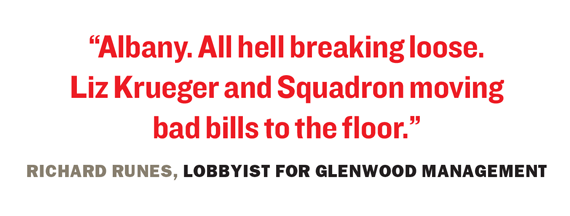
Developers then ramped up their contributions to help Republicans regain the Senate, giving at least $560,000 before year’s end. REBNY and the RSA chipped in another $350,000, records show.
Overall, REBNY has given $3.3 million and the RSA has contributed $6.6 million to various state races and party committees since 2000, complementing the developers’ contributions.
Young money
The Republicans recaptured the Senate in November 2010, costing Tkaczyk her analyst job and catapulting upstate Republican Catharine Young to prominence.
Young’s district lay south of Buffalo, on the shores of Lake Erie, hundreds of miles from New York City. From 2005, when she was first elected to the Senate, to 2010, she received almost no contributions from developers.
That changed in 2011, when she assumed the chair of the Senate housing committee. That year, developers gave her $58,500, most of it from Glenwood and Manhattan-based Rose Associates. REBNY and the RSA donated almost $52,000 to Young from 2011 through 2016.
Richard Shea, spokesman for Rose Associates, said that “a large number” of its contributions “were made to Democrats. This group of legislators is very pro-tenant and not necessarily known for its enthusiastic support of New York City real estate development…The assumption that each and every political donation is made solely to further a business agenda is unsupported by the facts.”
Almost immediately, Young began introducing bills to amend rent laws in favor of landlords. One bill would have allowed landlords to raise rents by as much as 20 percent when tenants died and their family members wished to take over the lease. Another proposed scrapping a long-standing rule allowing rent-stabilized tenants to secure two-year leases instead of the usual one year. A third would have allowed landlords to evict tenants who voted at the wrong location or filed their tax return with different addresses, on the grounds that their rent-stabilized apartments weren’t their primary residences, as required by law.
Another Young-sponsored bill would have vacated a court decision in favor of tenants of Independence Plaza North, a large rental complex in Manhattan, who sued their landlord, Laurence Gluck of Stellar Management. The court had upheld the tenants’ challenge of Gluck’s removal of the building from rent stabilization.
Senator Squadron, whose district includes the complex, debated Young on the Senate floor. “Does that provision on page 15 apply to any other addresses, to the sponsor’s knowledge?” he asked her in June 2011.
“Not that I’m aware of,” she replied.
“Imagine another member of this legislative body came in, chose a neighborhood in your community, 3,500 residents in your community, 1,300 homes in your community [and] said ‘you know what, I want to make it harder for these people to keep their homes,’” Squadron said.
Young’s bill passed the Senate, but died in the Assembly. While Gluck prevailed on appeal, the involvement of a senator whose district is closer to Cleveland than Manhattan still irks Diane Lapson, the president of the building’s tenant association.
“I don’t know if I’ll ever get over this whole situation,” Lapson said. “Why would she get involved in something like that, just like why would I get involved in farming issues upstate?”
Young declined to comment. Representatives for Gluck did not return requests for comment.
Strategic coup
Aiming to solidify their majority, Republicans gerrymandered a new, alligator-shaped district in 2012. Just under 300,000 in population, predominantly white, rural and lower income, the 46th Senate district cobbled together farming communities, depressed industrial towns and affluent Albany suburbs. It spanned five counties, but in places was barely wider than a city block.
The map couldn’t have been drawn better for George Amedore Jr., an Assembly member whose district fit neatly within the new seat’s borders. Frustrated over budget cuts to her school district, Tkaczyk decided to run against Amedore.
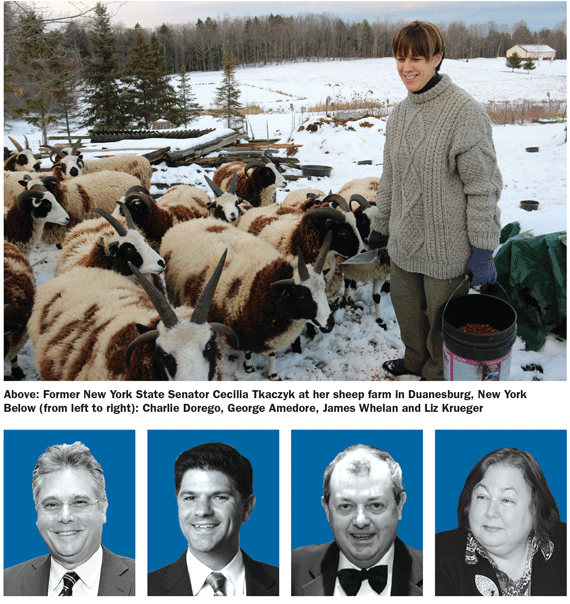
She knew fundraising would be vital. She loaned $40,000 to her campaign and raised $220,000 from individuals, unions and other Democratic groups, filings show. By contrast, Amedore garnered nearly $640,000, including almost $55,000 from Glenwood.
The Senate Republican Campaign Committee supplied part of this war chest, thanks to REBNY. In July 2012, the trade association sent out a fundraising appeal, emails from the Skelos corruption trial show.
“Control of the State Senate is again at stake this November,” Steven Spinola, then REBNY’s president, emailed developers, urging them to write $25,000 checks to the Senate Republican Campaign Committee. He reminded them that LLCs could be used for donations, attached a disclosure form, and requested contributions by the end of August.
“Another 25k. Jeez. Do 10k x 2 and 1 5k llc,” Dorego, the Glenwood executive, wrote to an assistant when he forwarded her an August reminder to make the contribution.
Senate Republican Campaign Committee finance reports show an influx of a quarter million dollars from real estate developers following REBNY’s solicitation. Glenwood gave $25,000, per Dorego’s instructions.
The Committee then transferred $100,000 to Amedore’s account in September, filings show, and incurred $400,000 worth of costs for his campaign in the following months.
Amedore’s TV spots portrayed Tkaczyk as a pawn of Manhattan financiers. One ad showed dollar bills falling from the sky in front of the iconic Chrysler building — part-owned by REBNY Chairman Rob Speyer. “Shadowy New York City money groups,” a narrator says, are “spending hundreds of thousands on negative attacks. Rewarding their candidates, like CeCe Tkaczyk, who push their agenda.”
Tkaczyk got a boost of her own. Two super PACs spent a combined $654,000 in late October and early November 2012 on TV ad buys, mailers, robocalls and polling, with much of it directly benefiting Tkaczyk.
The money came from Friends of Democracy, a group funded by Jonathan Soros, son of financier George Soros, and Protect Our Democracy, run by Facebook co-founder Chris Hughes. Both groups, perhaps ironically, sought to eliminate the influence of money in politics by electing candidates, like Tkaczyk, who backed public financing for elections.
By law, super PACs can raise and spend unlimited sums in any given race, as long as they disclose their donors and do not coordinate activities with candidates.
After a close race that couldn’t be called on election night, just 110 votes separated the two candidates, with 877 ballots challenged. The outcome, which would determine control of the Senate, wouldn’t be known for weeks.
Tkaczyk’s potential win worried the real estate industry, not least because of what it might mean for the LLC loophole. The day after the election, REBNY lobbyist Whelan forwarded an email announcement from the Democrats titled “Dems take back the Senate!” to Glenwood contacts and said, “we need to discuss campaign finance reform. Probably where we are initially most vulnerable,” Skelos corruption trial documents show.
In December 2012, as the counting of challenged ballots began, Klein and four other Senate Democrats broke away from the main Democratic caucus and sided with the Republicans. Klein said he was building a “bipartisan governing coalition” to advance “progressive policy issues that benefit all New Yorkers.” Critics said he made a deal to help Republicans keep control of the Senate in case Tkaczyk won.
And she did. Seventy-three days after Election Day, Tkaczyk was declared the winner by just 18 votes — one of the slimmest margins in New York State Senate history.
Political realities
One of the first bills before Tkaczyk and her Senate colleagues would extend a tax break for condos and co-ops. It was an important perk for Krueger’s constituents, but while sifting through the legislation, she spotted something strange. One section of the bill would grant 421a tax incentives to a handful of owners of specific lots in upper-crust Manhattan neighborhoods.
“The language was so odd,” Krueger recalled, that she and her staff couldn’t figure out why it had been included.
It turned out that the curious language, lobbied for by REBNY, benefited just five prominent real estate firms: Extell Development Company, Thor Equities, Silverstein Properties, Fisher Brothers and Friedman Management. It allowed them to receive 421a benefits while locating their required affordable housing in less desirable outer-borough locations rather than their high-priced complexes in Midtown Manhattan. Together, these developers have contributed at least $3.2 million since 2000 to state candidates, committees and PACs headed by real estate groups.
Senator Martin Golden, the measure’s sponsor, has received at least $80,500 from big developers in the 421a program, though none of the five developers who benefited from his bill has contributed to him. Golden, who said during a floor debate that he didn’t know why the carve-out was included, did not respond to requests for comment for this article.
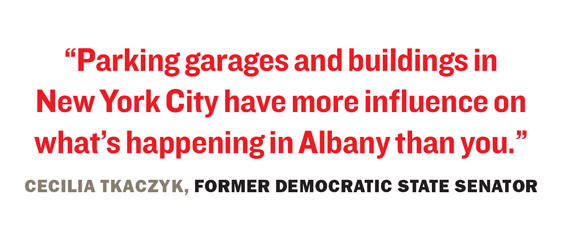
Extell President Gary Barnett said in an interview that the carve-out was justified and had nothing to do with political contributions. “It was a grandfathering for projects that were already in the works” and would have qualified for 421a under prior rules, he said, adding, “it’s just basic fairness.” The 421a benefit is worth about $9.2 million this year for Barnett’s One57 condo tower, according to the city’s Independent Budget Office.
Barnett also noted that the New York real estate lobby is one of many interest groups shaping state laws. “When you see a piece of real estate legislation that comes out and you see an outcome, that outcome doesn’t mean that that’s what REBNY wanted to have come out,” he said. “It means that it was the product of a compromise. REBNY had a seat at the table, luckily, or it would have been much more one-sided.”
The real estate tax bill passed. Krueger said she reluctantly voted for it because of the condo and co-op tax breaks important to her constituents. Tkaczyk and six other senators voted no.
Rather than money, “you can influence me with facts,” Tkaczyk explained over a December 2016 lunch at a sandwich shop in her former Senate district. “I didn’t think that there should be carve-outs for anybody.”
The approach did not earn her many friends across the aisle. Over the next two years, Tkaczyk struggled to move even the smallest bills to the floor. That included a minor bill that would have allowed a town in her district to share office space with a neighboring municipality. Tkaczyk said it was denied a floor vote by Skelos, then the Republican majority leader.
“Politics reared its ugly head and they refused to bring it to the floor,” Tkaczyk said.
Placing bets
In 2014, the real estate industry immediately targeted the rematch between Tkaczyk and Amedore. Jobs for New York, a super PAC controlled by REBNY, spent $2.5 million that year. More than $1.8 million came from 12 large New York City firms, which each gave at least $100,000. At least $518,000 went to help Amedore’s campaign, nearly five times more than any other New York political candidate.
On July 11, 2014, through LLCs at its luxury Manhattan properties, Glenwood gave $400,000 — the company’s largest one-day donation ever — to the Senate Republican Campaign Committee’s housekeeping account, plus $50,000 to another account. The housekeeping account funded at least $780,000 of “issue advocacy” during the 2014 campaign, disclosures show.
In Albany, issue advocacy is often a euphemism for negative advertising. More than $100,000 went to Prosper Group of Greenwood, Indiana, a Republican-leaning advertising agency also employed by the presidential campaign of Donald Trump in 2016. On its website, Prosper brags about “mass-media efforts” it developed for Amedore’s race and takes credit for moving his polling numbers up and Tkaczyk’s down.
Direct promotion of a candidate through a housekeeping account is barred by state election law, but the provision is often loosely interpreted by both parties. Contacted for comment, Risa Sugarman, chief enforcement counsel for the New York State Board of Elections, said attack ads could violate the law if they constitute campaigning for a candidate.
“Designating advertisements as issue advocacy doesn’t preclude them from being a campaign advertisement,” Sugarman said. Scott Reif, a Senate Republican Campaign Committee spokesman, said the committee’s spending was legal.
With one of their own in the race, the New York State Association of Realtors voted to spend more than $400,000 on Amedore’s behalf. “Amedore is a developer, home builder and card-carrying Realtor member,” Mike Kelly, director of the group’s political fund, said in an interview.
And again, Amedore’s campaign portrayed Tkaczyk as a closet Manhattanite.
“CeCe Tkaczyk voted with New York City interests 97 percent of the time,” the narrator of one ad — not tied to Prosper — declares, “sending them our money and raising our taxes.” Amedore then tells a group of voters that “we’re tired of having this disproportionate representation, always taking care of New York City, and upstate New York only getting crumbs.”
The ads struck a chord with some voters. Tkaczyk “was backed by downstate people,” said Barbara Watt, chair of the Republican Party in Tkaczyk’s town and a neighbor. “Most of her money came out of New York City.” Informed that Amedore had taken sizable sums from downstate developers, Watt brushed it off. “It’s unfortunate that it costs so much to run a campaign.”
Tkaczyk’s tenant supporters couldn’t match the developers’ deep pockets. One Friday evening in June 2014, they held a fundraiser in a community room at an Upper West Side apartment building. Over Costco shrimp and veggie platters, wine and crackers, they raised a few thousand dollars for pro-tenant candidates. Tkaczyk chipped in $100 herself. A few days later, the committee gave $3,300 to Tkaczyk’s campaign.
Tkaczyk also had other backers. As in 2012, unions and super PACs helped her. New York City Mayor Bill de Blasio helped raise funds for upstate races, giving Tkaczyk a lift (and later facing scrutiny over alleged violations of campaign finance laws). But Tkaczyk said most of the donations came too late in the campaign to make much difference. On election night, she lost by a wide margin.
‘Vehicle for bribery’
Once in the Senate, Amedore became a reliable vote for the real estate industry. In 2015, he supported an expansion of the 421a tax break.
As a member of the Senate elections committee, he helped kill a proposal by Squadron to eliminate the LLC loophole by voting to send it to another committee, where it died.
Amedore also introduced the same measure Tkaczyk had sponsored to let a town in the district merge its headquarters with a neighboring municipality. This time, it sailed through the Senate.
A spokeswoman for Amedore declined to make him available for an interview or answer written questions.
Tkaczyk now tends a flock of 30 spotted sheep and sells wool products at her store, CeCe’s Wool. “Right now I’m making dog beds and bed pillows and I’m really happy,” she said. She also volunteers as an advisor to the Museum of Political Corruption — an as-yet-unopened tourist attraction in Albany.
Had she been in office, Tkaczyk said, she would have voted to close the LLC loophole.
“It’s a vehicle for bribery,” she said. “Parking garages and buildings in New York City have more influence on what’s happening in Albany than you.”

